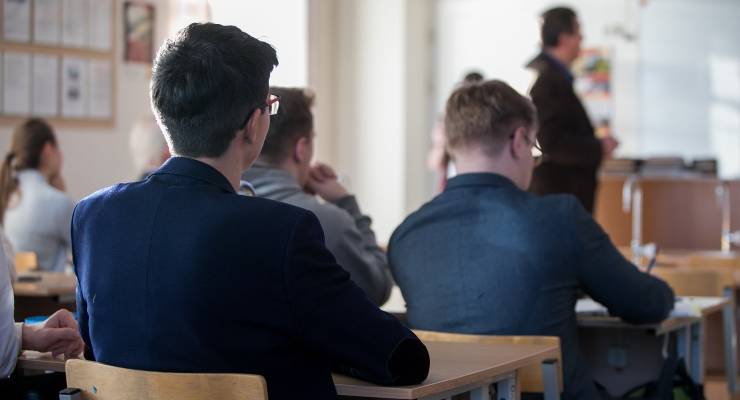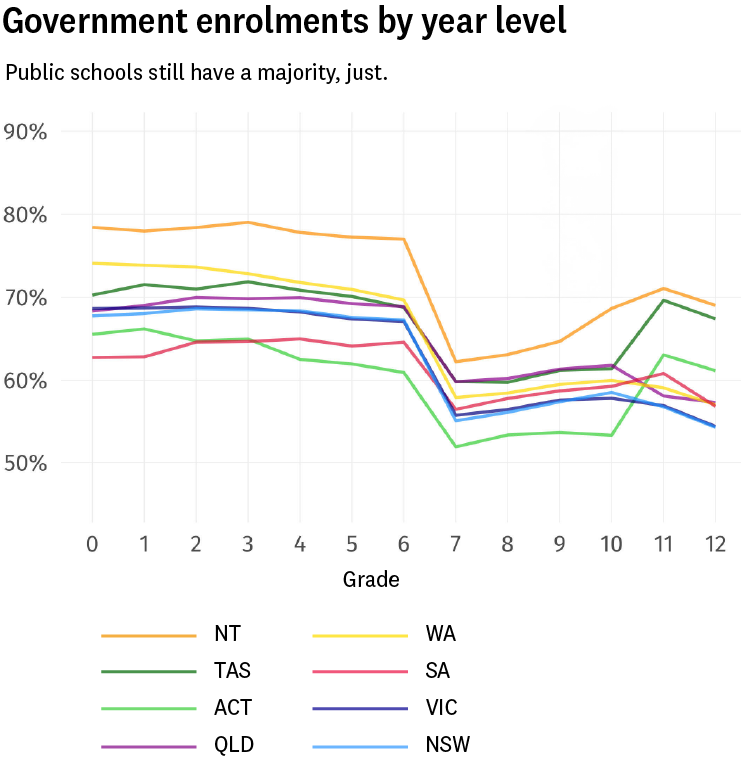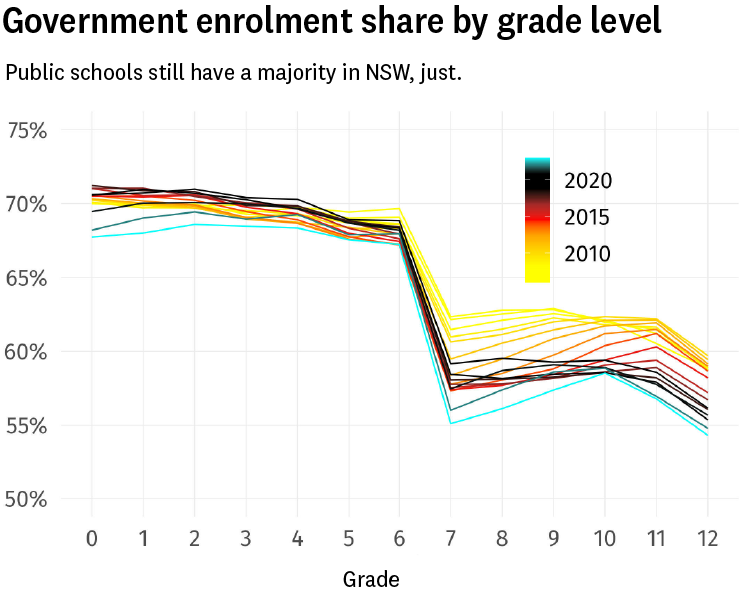
Australians absolutely love putting their kids in a blazer and boater hat. Even amid the worst cost of living crisis in memory, and as people tighten their belts in many domains, private schooling remains sacrosanct in some family budgets.
Many families are eating tinned beans but refusing to send their kids to the local state school. Data for schools in 2023 has been released by the Australian Bureau of Statistics and it shows that we are leaving the government system in droves.
As the next chart shows, enrolment in Catholic and independent schools is up compared to 2021 and 2022.

The next chart shows when people go private. It’s not usually at primary school. Only when kids hit secondary school do parents start to wonder about the old-school tie.

In NSW and Victoria, private schools become more popular in Years 11 and 12. There are two main reasons for this: student attrition at government schools as kids drop out altogether, and parents vying for university places by putting their kids in private for the final two years of HSC/VCE.
However, in Tasmania and the ACT, public schools pop up again in Years 11 and 12 due to their system of separate schools for the last two years of high school. In the ACT it’s not uncommon for students to transfer to two-year public “colleges” with excellent reputations for their final two years of schooling.
Not all Australians are equally likely to opt for private schools. As the chart above shows, school choice varies a lot by where in the country you live. The wealthy and geographically concentrated families of the ACT are most likely to opt for private schools, while the less wealthy and geographically dispersed families in the Northern Territory are more likely to choose government schools.
South Australia has the most enthusiasm for private early primary schooling, whereas in Queensland private primary schooling is relatively rare. (Bluey, the cartoon dog Australia is exporting to a rapturous reception from the rest of the world, attends a private primary school in Queensland, making her a not very representative emissary).
The next chart shows how enrolment in government schools has shrunk in NSW over time. In 2023, at every grade level, the government system is doing less heavy lifting in our largest state.

Some of this has to do with funding. There’s a very visible, very wealthy cohort of independent schools that serve families with very high incomes while also drawing on extremely generous funding. Schools like Melbourne’s Haileybury College. The Gonski reforms haven’t reached those schools yet.
But those schools are relatively few in number. The bulk of the competition to government schooling comes from Catholic schools and less glamorous independent schools.
The fundamental problem is not that private schools are heavily funded. It’s that government schools are underfunded such that they become, in many places, a choice of last resort. But as the experience in ACT colleges shows, government schools can excel so that well-resourced families want to opt into them. It just requires the political will to do so.
Does the government need to give more money to public schools? Let us know your thoughts by writing to letters@crikey.com.au. Please include your full name to be considered for publication. We reserve the right to edit for length and clarity.








Another crack in the foundation of our society, courtesy of that vandal Howard.
Looking forward to his grave existing so I can piss on it.
Get there early Kimmo, or you might have to queue up at the grave site.
Australia needs to be careful of not falling further into the US ‘libertarian trap’ ie. encouraging and supporting religious, independent and charter schools as a way of strangling public or state education.
I think that ship has sailed, it’s here.
I totally agree. We are the 51st state of the benighted states of America.
That ship has sailed, come back, and set off on a second voyage.
Australia has a MUCH higher percentage of students in private schools than the USA (and, indeed, nearly every OECD country).
I worked as a secondary teacher (teaching inter alia, junior mathematics and science and senior chemistry), for the last 40 years of my working life. I worked full-time in state and private schools. I can say without a shadow of a doubt that the equipment and overall conditions in many private schools are absolutely palatial compared to those that exist is many government schools. This is wrong. But it is not unexpected in a free-market capitalist society. Furthermore, the ‘culture’ (for want of a better word) here in Australia is not one that values education in general or scholastic achievement in particular. However, this situation has been ameliorated somewhat over the years by the influx of migrants from Asia and those with a Jewish background.
The only time that education becomes a priority for the ‘average Aussie’ is when they have to worry about their own kids’ education. Then, as you would expect in an atomized, individualized, libertarian society, it is a case of ‘splashing the cash’ (where you have it available) for the benefit of your own kids. As for the educational opportunities of other people’s kids, well that’s for others to worry about.
Now it also seems that education has become an ‘industry’ in this brave new Orwellian capitalist world. Do you really expect things are going to improve while we have this economic/political model? I know, I don’t!
That’s only a consequence of the fundamental problem, which is that those who pay for their children to be privately educated are in competition with those who use the state system. They are paying for their children to do better, and so it is in their interest for state educated children to do worse. Parents who buy education for their children have good reasons to vote against any improvements or increases in funding for state schools, and for subsidies and tax breaks that help private schools. No doubt some have enough of a conscience that they still try to support state education, or say they do, but doing that does not make much sense.
If private education is a small fraction of educations as a whole this might not affect state education very much. But when private schools are a very significant part of the whole, as it is now, it is inevitable that state education will become a neglected, under-resourced and inadequate safety net only used as a last resort by those with no choice. And the more parents see that, the worse it will get for state education.
If everybody uses the state’s provision of something, there is an irresistible demand for it to be excellent. But whenever the state provides something in competition with something that the wealthier in society choose to pay for privately, the tendency is for the state’s option to be deliberately reduced to the minimum possible because the wealthy and well-connected have no wish to see their taxes pay for it.
Good argument. But how the hell do you convince the private school advocates? It’s a bit like telling investment homeowners that negative gearing, franking credits, and capital gains reductions are bad for housing availability. Some people would sooner shoot you than listen to reason.
Great points! The one fact that is a delight to hear is how public school students do much better at uni than private school students, as they’re not reliant on being spoon fed. Sadly however, when it comes to jobs the old boys’ school tie does win out. Again objective performance is not better for private school students, but political skill is and all too often the ability to play political games can win out. It is the good talkers and good players who win, not the good performers on the job. We see that in politics as well as in big organisations more generally. So much for a meritocracy.
One issue, not mentioned, is that the previous NSW LNP government didn’t bother building state schools near new housing developments. Religious institutions, especially fundamentalist Christian sects, leapt in to fill the gap with low fee schools which cost very little – thanks to massive government subsidies.
It’s almost as though they planned it that way
Not all are Christian. I have first hand experience of a mini boom in ethnically- and culturally-centred schools, based around a non-Christian religion.
RWNJs anyone?